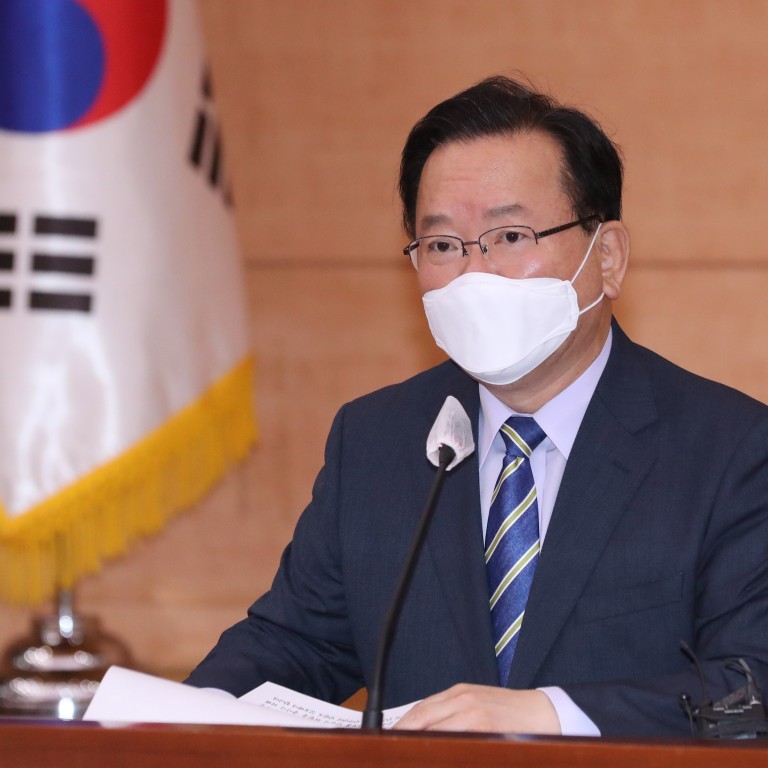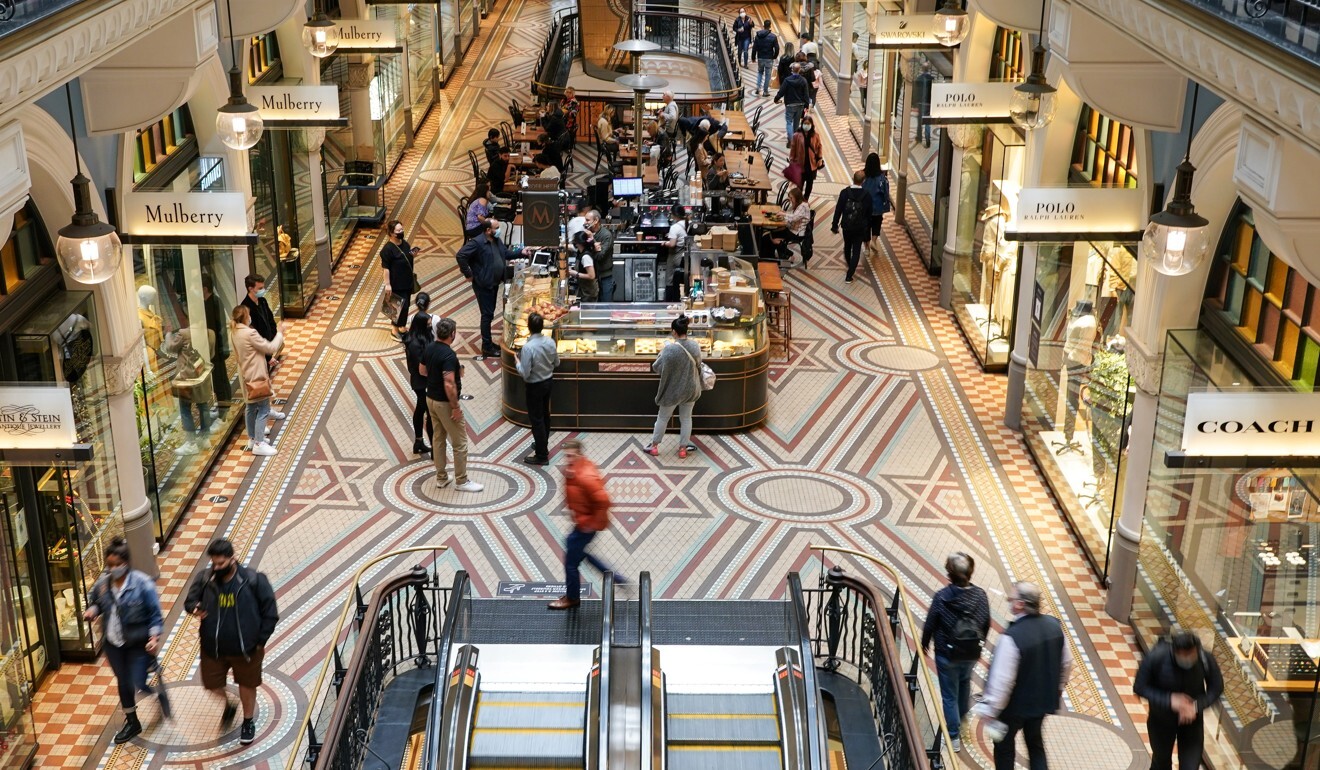
Coronavirus: South Korea debates how to live with Covid-19 and reopen economy
- A newly-launched panel will look into a strategy for returning to normal life and relaxing coronavirus restrictions as vaccination levels rise
- Elsewhere, Australia’s New South Wales may ease remaining curbs earlier than planned as it nears the 80 per cent inoculation mark
Under the strategy, the government aims to relax coronavirus restrictions for citizens who can prove they have been fully vaccinated, while encouraging asymptomatic and mild Covid-19 patients aged below 70 to recover at home, the health ministry said last week.
The government will also focus on the number of hospitalisations and deaths rather than new daily infections, and will consider not publishing the latter on a daily basis, Yonhap news agency reported.
Singapore and South Korea to launch quarantine-free travel lane
“We will turn Covid-19 into a controlled infectious disease and no longer a fear of the unknown, and return a complete routine to the citizens,” Prime Minister Kim Boo-kyum told the panel’s first committee meeting on Wednesday, adding that mandatory mask-wearing would not be immediately scrapped under the new policy.
South Korea never imposed a full lockdown but has been under its tightest social distancing curbs since July.
These include limited operating hours for restaurants, cafes, saunas and indoor gyms – which have hit the self-employed and small businesses particularly hard – and a cap on gatherings of more than two people after 6pm in and around Seoul.
In September, the government announced plans to expedite a phased return to normalcy starting in November when 70 per cent of its 52 million people are expected to have been fully inoculated.
South Korea has kept hospitalisation and deaths at a fairly low rate. It had 359 severe cases and a mortality rate 0.78 per cent as of Tuesday, official data showed.
The country reported 1,584 new Covid-19 cases on Tuesday. It has recorded a total of 335,742 infections and 2,605 deaths.
Philippines eases capital’s curbs
Metro Manila, which accounts for a third of the nation’s economic output, will shift to a looser Alert Level 3 from October 16 to 31, presidential spokesman Harry Roque said in a statement.
Most businesses are allowed to operate at full capacity, while casinos, spas and indoor tourist attractions can reopen at 30 per cent capacity, based on earlier government guidelines. More cities and provinces outside the capital were also placed under the looser form of quarantine.
Asia’s rich, powerful grab Covid-19 booster shots at common folk’s expense
Fully-vaccinated passengers from overseas will also no longer be required to undergo facility-based quarantine, and will only be asked a negative Covid test taken within 72 hours prior to departure.
The Philippines, which fell to last place in Bloomberg’s Covid Resilience Ranking late last month, has seen infections drop to below 9,000 in the past days, hitting a two-month low. Travel rules for locals have been eased, as the economy struggles to recover from the pandemic.
The Southeast Asian nation has opened vaccinations to all adults, and will begin inoculating minors this week, as it tries to keep up with its neighbours on vaccine roll-out. Nearly 22 per cent of the population is fully vaccinated.

Australia’s NSW could ease more restrictions
The state is expected to hit the mark over the weekend, beating forecasts, and officials previously promised to relax further restrictions on vaccinated residents on the first Monday after reaching that milestone.
“If we hit 80 per cent, we’ve always said it will be the Monday following,” state Premier Dominic Perrottet told ABC Radio. “We will have this discussion with our team on Thursday and we will make a decision to be announced on Friday.”
Retail stores, pubs and gyms can allow more vaccinated patrons when inoculation reaches 80 per cent. Mandatory masks will not be required inside offices and nightclubs can reopen for seated drinking, while weddings can have unlimited guests.
‘Freedom day’ as Sydney ends nearly four-month Covid-19 lockdown
Sydney’s more than 5 million residents came out of a nearly four-month lockdown on Monday after the 70 per cent vaccination target was reached, with state officials promising a phased easing of remaining restrictions after vaccination rates reach 80 and 90 per cent.
Daily infections in New South Wales rose to 444 on Wednesday, up from 360 a day earlier, but well down from the pandemic high of 1,599 in early September.
Canberra’s 400,000 residents will exit lockdown on Friday as the first-dose vaccination rate topped 95 per cent, one of the highest among Australia’s regional capitals. Victoria, which includes Melbourne, suffered the deadliest day of the Delta outbreak on Wednesday with 13 deaths. It reported 1,571 new infections, up from 1,466 on Tuesday.
Why Australia’s bumper avocado season is stressing out farmers
Meanwhile, shopworkers, tourist guides and barbers are among dozens of groups who must get Covid-19 shots to work in Australia’s Northern Territory, officials announced on Wednesday, unveiling one of the world’s most far-reaching vaccine mandates.
By Christmas Eve, anyone working with the public must be fully vaccinated or face a A$5,000 (US$3,700) fine and instant dismissal.
Even with the Delta outbreaks, Australia has managed to keep its coronavirus numbers relatively low, with some 133,400 cases and 1,478 deaths.
Vietnam cancels lockdowns
In a directive posted on the government’s website on Wednesday, the government requested that all provincial authorities temporarily suspend strict social distancing measures and cancel lockdowns applied 18 months ago to combat Covid-19.
Should it become necessary to apply lockdowns district-wide or on a provincewide scale, provincial authorities will have to ask the government for approval.
Companies and people are now allowed to travel within Vietnam but still need to comply with Covid-19 regulations.
Holiday shopping on the line amid exodus of workers from Vietnam’s factories
The government has issued three directives outlining Vietnam’s strongest measures for preventing and controlling the coronavirus, allowing provincial authorities to apply lockdowns in localities. Those directives mandate strict social distancing throughout the country using the following motto: “Families have to be distanced from families; villages should be distanced from villages … provinces should be distanced from provinces.”
Those directives have seriously affected all sectors of the economy, leading the country’s GDP to shrink by 6.17 per cent in the third quarter of this year – the nation’s sharpest quarterly drop on record since 1986.
Vietnam has reported nearly 21,000 coronavirus-related deaths during the pandemic. As of October 12, the country had fully vaccinated over 16 million people out of a total population of 98 million, one of the lowest immunisation rates in Asia.
Reporting by Reuters, DPA, Agence France-Presse, Bloomberg

